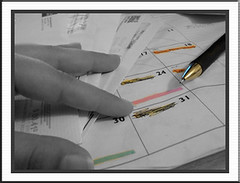 Originally uploaded by watersgirl
Originally uploaded by watersgirlAin’t got no money, but they won’t leave me alone. Ieeehooowaaaa, thank you, thank you very much. My family is worried about me. I’m not working and have no plans or desire to get a job. When they bring it up, I tell them that my husband and I can make it without the extra income. How can I be reassuring after my car loan company calls them? For reasons I’ll share later, my husband and I decided that it is better for me to stay at home right now. At this point, we are both rethinking our plans, but things are complicated.
I don't recall any formal money lessons from my parents, like why net worth is important or how to maintain a good credit score, but I did hear golden nuggets from time to time. My dad instilled the belief that frugality is power (the less you need, the more you’re in control), and he told me it was important to have your own business. My mom showed me how strategic shopping streches the dollar and how self discipline (telling yourself no) is a necessity. Both parents taught me that if you need more money, work more hours and increase your skills so that you can get raises and promotions. My grandmother used to tell me all the time to pay myself first. I was never sure what that meant, but I assumed it meant to take out some money and put it into my savings.
By the time I went to college, I’d saved $3,000 and was very proud of myself, but I had no plan and very little financial intelligence. My first semester I paid for half of my tuition and my dad paid the other half. That left me $1,500 in the bank, and it did not take long to spend the rest. I paid for college with credit cards and student loans. I thought I was better off than my friends who were getting into debt for clothes, hair and trips. The more I worked, the more frugal I became, but my debt still grew as the tuition was raised every year. I started off financially responsible at first, paying off my credit card balances after every purchase, only charging school related stuff, and paying bills as soon as I received them. But then I started making mistakes, like buying my friends books with the agreement that they would pay me back. After watching them buy new clothes despite their claims that they didn’t have the money to pay me back, I learned not to loan money I couldn't afford to give away.
For the first time, I enjoyed studying, completing homework, and doing research for my classes. I’d never received a 4.0 in high school, but I was happy now that I could go out whenever I wanted to and did not work. I did great academically. The problem was that when I started adding bills, that led to needing more hours at work. Every addition to my work schedule was a subtraction from my GPA. The less content I was, the more money I needed: I needed more privacy, then I needed an apartment, then I needed a car, then I needed car insurance, then I needed ...
Fast forward to now. I have a lot of debt (mainly school loans), no degree, and no job. I understand much more about money and building wealth, but money has more to do with your values and fears than it does with accounting skills. Knowing is a small part of the battle when you consider things like family dynamics, personal priorities, and health complications. This does not jutify bad decisions, but personal realities cannot be ignored. You should always look both ways before you cross the street, but if a serial killer is chasing you with a butcher knife, you might change your priorities to getting away and calling attention to yourself. Regardless, I still make tons of mistakes; I won't deny making dumb decisions, but most of my money decisions are made with a lot of consideration and discernment. Sometimes my best does not seem like much, but only I know the efforts I make to improve my station in life. I can't explain why it makes sense to start blogging for profit when I need money now. All I can say is living a life without passion and purpose is not really living. Yes, I still have the Bad Credit Blues, but I'm in the process of finding my thrill.





2 comments:
it's ok to commit mistakes just as long as you learn from them. it seems money is getting harder to earn nowadays so I try to stay at home more often to avoid spending but the bills still come. I think these are the things you can't actually control. sad..
Not sad. I like saving money. It is just hard now because I went from working OT to support one person to not working and trying to manage money with three. I am learning but they seem like all new lessons. Thank you Gie, I'm trying.
Post a Comment